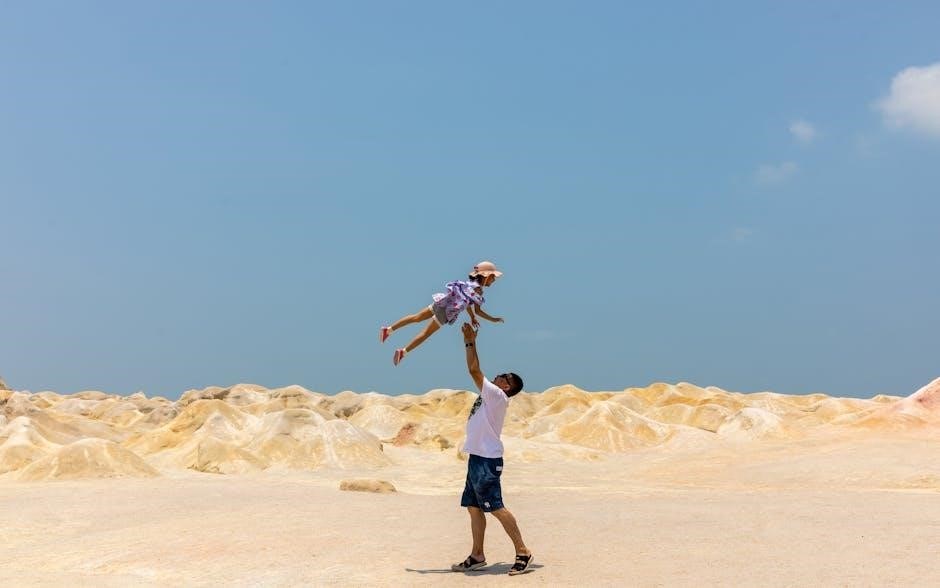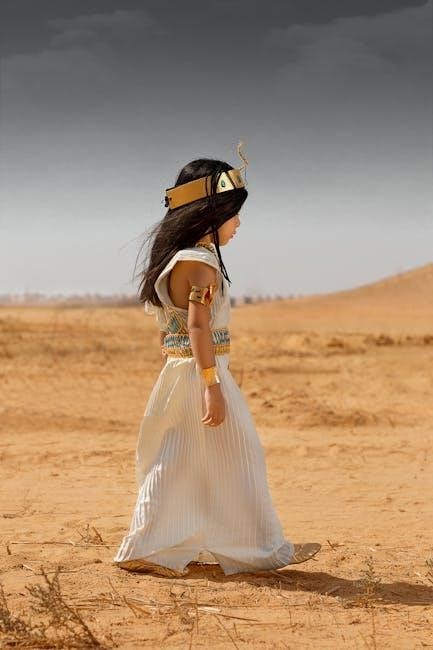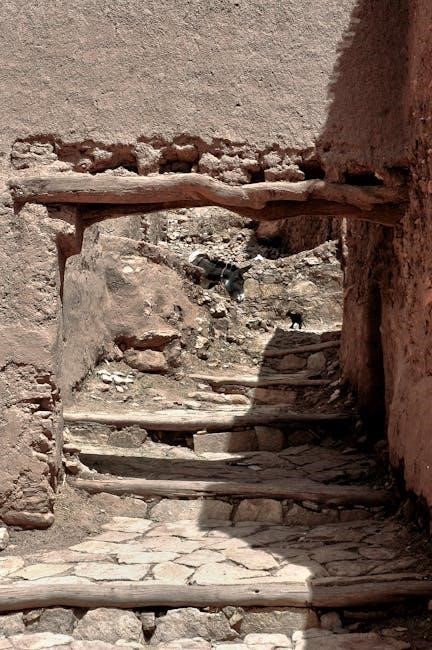Other Desert Cities is a compelling drama by Jon Robin Baitz, exploring family dynamics, political divides, and personal identity through the Wyeth family’s reunion in Palm Springs․
1․1 Overview of the Play
Other Desert Cities is a gripping drama by Jon Robin Baitz, set in Palm Springs during a family reunion․ The play revolves around Brooke Wyeth, a liberal East Coast writer, who returns home after years of estrangement․ She brings a controversial memoir that exposes a dark family secret, sparking intense conflict with her conservative parents, Polly and Lyman․ The story explores themes of political divides, personal identity, and the complexities of familial relationships․ Through sharp dialogue and emotional depth, Baitz delves into the tensions between East Coast and West Coast ideologies, creating a poignant commentary on family values and cultural clashes․ The play is both a drama and a dark comedy, capturing the essence of a dysfunctional yet deeply connected family․
1․2 Historical Context and Relevance
Other Desert Cities reflects the political polarization of early 2010s America, capturing the ideological divides between conservatism and liberalism․ Set against the backdrop of a desert city, the play mirrors societal isolations and divisions․ Its exploration of family conflict, political tensions, and personal identity resonates with contemporary themes, making it timeless․ The play’s relevance lies in its ability to portray universal struggles, transcending its historical setting to address ongoing issues of cultural and political clashes․ Baitz’s work remains a powerful commentary on family dynamics and societal fractures, continuing to engage audiences with its poignant and thought-provoking narrative․

Plot and Themes
Other Desert Cities revolves around the Wyeth family’s tense reunion in Palm Springs․ Brooke’s memoir sparks political and emotional clashes, exploring liberalism vs․ conservatism, identity, and loyalty․
2․1 The Wyeth Family Dynamics
The Wyeth family dynamics are central to the play, revealing a complex web of relationships․ Brooke, the liberal writer, clashes with her conservative parents, Polly and Lyman, who embody traditional values․ Their interactions are fraught with tension, as Brooke’s memoir threatens to expose family secrets, creating a divide between loyalty to her roots and her individual identity․ Meanwhile, Trip, the younger brother, often acts as a mediator, attempting to balance the family’s volatile emotions․ Their dynamics reflect broader societal conflicts, making their interactions both deeply personal and universally relatable․
2․2 Brooke’s Memoir and Its Implications
Brooke’s memoir is a pivotal element in the play, revealing a long-hidden family tragedy involving her brother Henry’s radical activism and subsequent suicide․ The memoir forces the Wyeth family to confront their past, creating tension and conflict․ Brooke’s decision to publish it is both a therapeutic act and a provocation, challenging her parents’ conservative values and silence․ The memoir’s implications extend beyond personal revelation, symbolizing the clash between truth and family secrets․ It strains relationships, particularly with her parents, while highlighting Brooke’s journey from silence to self-expression․ The memoir becomes a catalyst for the family’s reckoning, exposing wounds and testing their bonds․
2․3 Political and Cultural Conflicts
The play delves into the political and cultural tensions between Brooke, a liberal East Coast writer, and her conservative parents, Polly and Lyman․ Their differing ideologies create friction, reflecting broader societal divides․ The desert setting of Palm Springs symbolizes both isolation and the clash of East Coast intellectualism with West Coast conservatism․ Brooke’s memoir acts as a catalyst, exposing these conflicts and forcing the family to confront their divergent values․ The play explores how political beliefs shape identity and relationships, highlighting the struggle between tradition and progress․ These conflicts drive the narrative, revealing the complexities of family dynamics and societal expectations;
Character Analysis
Brooke Wyeth, a liberal writer, clashes with her conservative parents, Polly and Lyman, while Trip mediates, revealing deep personal and political tensions within the family․
3․1 Brooke Wyeth: The Liberal Writer
Brooke Wyeth, a liberal East Coast writer, returns to her conservative family’s Palm Springs home, carrying a memoir that exposes long-buried secrets․ Her manuscript, detailing a tragic family event, sparks tension and confrontation with her parents, Polly and Lyman, who represent the opposite end of the political spectrum․ Brooke’s identity as a writer and her progressive views clash with the Wyeth family’s traditional values, creating a complex dynamic․ Her decision to publish the memoir reflects her struggle for personal truth and artistic integrity, while also revealing her deep-seated need for validation and connection with her roots․ This internal and external conflict defines her character as both flawed and resilient․
3․2 Polly and Lyman Wyeth: The Conservative Parents
Polly and Lyman Wyeth are the conservative parents of the Wyeth family, living in Palm Springs․ Their traditional values and political views starkly contrast with their daughter Brooke’s liberalism․ Polly, sharp-tongued and controlling, struggles with Brooke’s choices, especially her memoir, which threatens to expose family secrets․ Lyman, a former actor, maintains a charming facade but internally grapples with the looming consequences of Brooke’s revelations․ Both parents embody the rigid, old-fashioned ideals of their generation, resisting Brooke’s progressive outlook․ Their interactions reveal a deep emotional divide, as they cling to their beliefs while facing the reality of their fractured family dynamics and the impending publication of Brooke’s manuscript․
3․3 Trip Wyeth: The Mediator
Trip Wyeth, the youngest sibling, acts as the family mediator, attempting to balance the volatile dynamics between his parents and sister Brooke․ His laid-back and humorous demeanor often serves as a buffer against the tension․ Unlike Brooke, Trip has distanced himself from the family’s political conflicts, choosing a career in television to avoid controversy․ Despite his efforts to remain neutral, Trip struggles with his own identity and the pressure of maintaining peace within the family․ His role highlights the challenges of navigating a family divided by ideology and the emotional toll it takes on those caught in the middle, as he tries to keep the family united amidst their fracturing relationships․
Dramatic Structure
The play is structured into two acts, beginning with the family reunion and escalating tensions, leading to a dramatic confrontation and resolution of deep conflicts․
4․1 Act 1: The Family Reunion
Act 1 of Other Desert Cities sets the stage with the Wyeth family reuniting in their Palm Springs home during Christmas․ Brooke, the estranged daughter, returns after years, bringing her controversial memoir manuscript․ The act introduces the family dynamics, with Polly and Lyman, Brooke’s conservative parents, expressing unease about her writing․ Trip, Brooke’s brother, mediates the tension, while Silda, Polly’s sister, adds wit and complexity to the interactions․ The act builds suspense as Brooke reveals her manuscript, which threatens to expose long-buried family secrets, creating a volatile atmosphere that foreshadows the conflicts to come in Act 2․
4․2 Act 2: Confrontation and Resolution
Act 2 of Other Desert Cities escalates the tension as Brooke’s memoir sparks heated debates within the Wyeth family․ The emotional confrontation reveals deep-seated conflicts, particularly between Brooke and her parents, Polly and Lyman, who struggle with her portrayal of their family’s past․ Trip and Silda attempt to mediate, offering moments of levity and insight․ The act culminates in a resolution that, while not entirely reconciliatory, brings a sense of closure․ Through poignant dialogue and dramatic intensity, Act 2 highlights the complexity of family relationships and the enduring impact of choices made in the name of love, loyalty, and identity․

Setting: Palm Springs as a Desert City
Palm Springs, a luxurious desert city, serves as the backdrop for the Wyeth family’s reunion․ Its stark beauty and isolation amplify the emotional tensions and conflicts․
5․1 The Significance of the Desert Landscape
The desert landscape in Other Desert Cities serves as a symbolic backdrop, reflecting the emotional and psychological terrain of the characters․ The arid, vast expanse mirrors the family’s internal barrenness and isolation․ Palm Springs, with its luxurious facade, contrasts sharply with the desolation of the desert, highlighting the tension between appearance and reality․ The desert’s harsh beauty underscores the characters’ emotional distances and the clash between their East Coast and West Coast ideologies․ It also symbolizes the fragility of life and the search for meaning in a politically and culturally divided world․ The setting amplifies the play’s themes of isolation, conflict, and the struggle for identity․
5․2 Palm Springs as a Symbol of Isolation
Palm Springs, with its luxurious resorts and sun-drenched landscapes, paradoxically embodies isolation in Other Desert Cities․ The city’s serene beauty contrasts with the emotional distance within the Wyeth family, highlighting their disconnection․ The desert’s vastness and the city’s gated communities symbolize the characters’ physical and emotional isolation․ Brooke’s return from the East Coast underscores the cultural divide, while the city’s idyllic facade masks the family’s inner turmoil․ Palm Springs serves as a metaphor for the characters’ inability to bridge their differences, illustrating how even in a place of beauty, isolation can prevail, deepening the play’s exploration of family estrangement and ideological clashes․

Cultural and Social Commentary

Other Desert Cities delves into the cultural divide between liberalism and conservatism, exploring the tensions between family values and individual identity․ The play critiques societal norms, highlighting the clash between East Coast intellectualism and West Coast conservatism․ Through the Wyeth family, Baitz examines the fracturing of political ideologies and the struggle for personal authenticity․ The desert setting mirrors the characters’ emotional isolation, emphasizing the broader societal disconnect․ The play challenges viewers to reflect on the complexities of family loyalty, political conviction, and the enduring search for belonging in a fragmented world․ Its commentary remains timely, resonating with contemporary debates on identity and culture․
6․1 Family Values vs․ Individual Identity
Other Desert Cities explores the tension between family values and individual identity through Brooke Wyeth’s return to Palm Springs․ Her memoir reveals a devastating family secret, sparking conflict with her conservative parents, Polly and Lyman․ The play highlights the struggle between loyalty to family and the pursuit of personal truth․ Brooke’s liberal identity clashes with her parents’ traditional values, creating a rift that challenges their relationships․ The desert setting amplifies the emotional isolation, symbolizing the disconnect between generations and ideologies․ Through this conflict, Baitz examines how family dynamics shape individual identity and the cost of staying true to oneself amidst societal expectations and familial obligations․
6․2 East Coast vs․ West Coast Ideologies
Other Desert Cities delves into the ideological divide between the East Coast and West Coast through Brooke Wyeth’s journey․ As a liberal East Coast writer, Brooke’s values clash with her conservative West Coast family in Palm Springs․ The play portrays the East Coast as intellectual and politically charged, while the West Coast embodies a more relaxed, traditional lifestyle․ This tension reflects broader cultural differences, with Brooke’s memoir symbolizing her East Coast identity and her parents’ resistance representing the West Coast’s conservative roots․ The desert setting amplifies this divide, highlighting the emotional and ideological distance between the two coasts and their respective worldviews․
Other Desert Cities leaves a lasting impact, offering poignant reflections on family, identity, and political divides․ Its thought-provoking narrative resonates deeply, encouraging introspection and understanding of complex human relationships and societal conflicts, while highlighting the enduring relevance of its themes in contemporary discourse․
7․1 The Play’s Legacy and Impact
Other Desert Cities has left a significant mark on contemporary theater, praised for its nuanced dialogue and profound exploration of family, politics, and identity․ The play’s ability to balance humor with intense emotional depth has made it a favorite among audiences and critics alike․ Its thought-provoking themes resonate widely, encouraging discussions about cultural divides and personal responsibility․ As a finalist for the Pulitzer Prize, it has cemented its place in dramatic literature․ The play’s relevance continues to grow, making it a staple in theater productions and academic studies, offering timeless insights into the complexities of human relationships and societal conflicts․
7․2 Lessons from “Other Desert Cities”
Other Desert Cities offers profound lessons about family, identity, and reconciliation․ It highlights the importance of understanding differing perspectives, even within the same family, and the challenges of bridging ideological divides․ The play underscores the power of storytelling, as Brooke’s memoir becomes a catalyst for both conflict and catharsis․ It also emphasizes the need for compromise and empathy in navigating generational and cultural differences․ Ultimately, the play teaches us that true connection requires confronting uncomfortable truths and embracing the complexities of human relationships․ These lessons resonate universally, making the play a powerful exploration of what it means to belong and to forgive․
